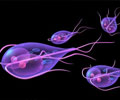A team of international researchers has come up with a response program that can rapidly restore the use of drinking water networks in case of a deliberate contamination event.

SecurEau, a four-year Seventh Framework Programme funded project, involved 12 partners, including the University of Southampton, from six European countries. It has developed a toolbox that can be implemented by a major European city in response to a contamination event, which includes:
- tools for detecting water quality changes;
- methods for rapidly identifying the source(s) of intentional contamination;
- multi-step strategies for cleaning distribution systems;
- analytical methods for confirming cleaning procedure efficiency.
Research groups from the University of Southampton, the only UK partner in the project, developed new methods and technologies for detecting low levels of microbial and radiological contaminants and improving the efficiency of decontamination protocols, with special attention to the role of biofilms.
Source-Eurekalert













